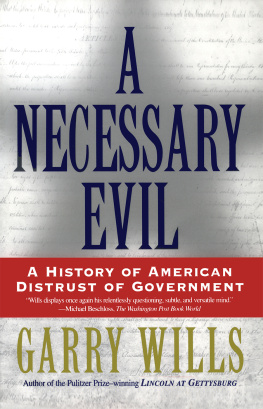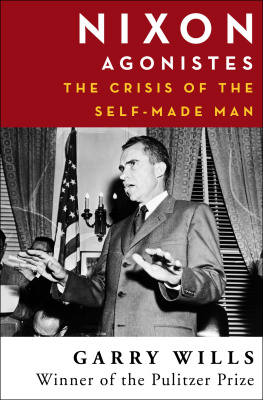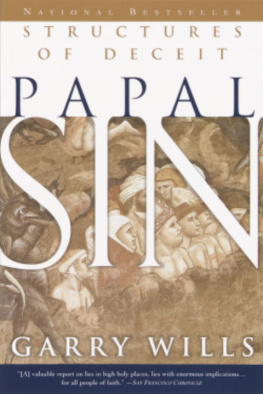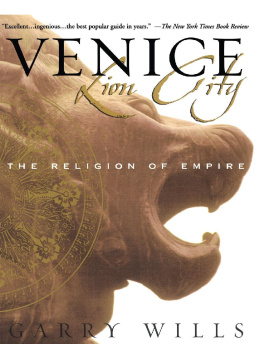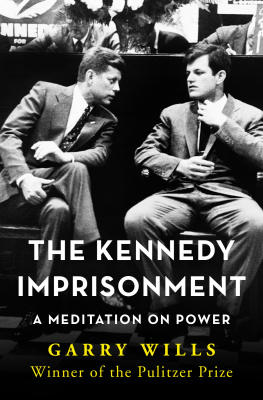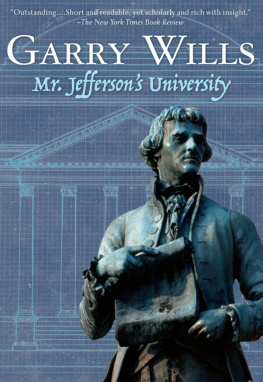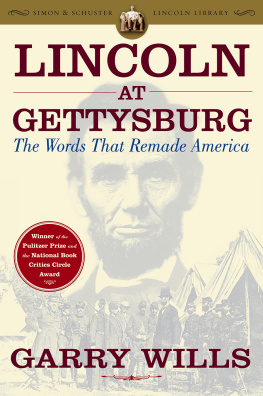Thank you for downloading this Simon & Schuster eBook.
Join our mailing list and get updates on new releases, deals, bonus content and other great books from Simon & Schuster.
C LICK H ERE T O S IGN U P
or visit us online to sign up at
eBookNews.SimonandSchuster.com
We hope you enjoyed reading this Simon & Schuster eBook.
Join our mailing list and get updates on new releases, deals, bonus content and other great books from Simon & Schuster.
C LICK H ERE T O S IGN U P
or visit us online to sign up at
eBookNews.SimonandSchuster.com
Praise for A Necessary Evil
Wills sets out to correct the most egregious historical errors asserted by antigovernment groups. These case studies are fun to read.
Pauline Maier, The New York Times Book Review
Proposes an intriguing argument for why any good society requires a government capable of acting in the public interest... Wills... writes so skillfully, and in such a reasonable way, that the reader is led along in agreement.
Alan Wolfe, The New Republic
Willss talent is to challenge the reader to see an old familiar topic in a new way.... A Necessary Evil contains vivid portraits of Americas most famous radical antistatistsfrom the minutemen... to modern-day SDS, NRA, and term-limit hotheads.... Both timely and topical.
Public Administration Review
A book that succeeds in its main purpose, that of removing the prop of the Founders and the Constitution from antigovernmentalists. A Necessary Evil is a stimulating and important analysis of a peculiarly American phenomenon.
Salon.com
A thought-provoking framework for understanding Americans pervasive distrust of their government.
Bookpage.com
With the breadth of knowledge and stylistic astringency that have characterized his score of other works, Pulitzer Prize winner Wills attacks skepticism about federal power that corrodes political discourse. An iconclastic history of one of the major currents in American politics, written with relentless logic and scholarly lean.
Kirkus Reviews
An eloquent plea for the American electorate to view government as a necessary good.
Publishers Weekly
A timely analysis of the distorted mythology that has grown up around government in the U.S. Provocative and enlightening.
Booklist
A most relevant, timely, and needed work that should take its place beside Richard Hofstadters classic The Paranoid Style in American Politics . Highly recommended.
Library Journal
Acknowledgments
Again I am indebted to my peerless editor (Alice Mayhew) and agent (Andrew Wylie). Also to John C. Wills, who brought me (belatedly) into the computer age with this book. Readers who were particularly helpful were Gordon Wood of Brown University on the founding period and Steven Lubet of Northwestern University Law School on matters constitutional.
Contents
To the Unicorn symposiasts
for all they teach me
Key to Brief Citations
AF | The Complete Anti-Federalist, edited by Herbert J. Storing (Chicago: University of Chicago Press, 1981), vols. 17 |
CC | Letters to Members of the Continental Congress, edited by Edmund C. Burnett (Washington, D.C.: Carnegie Institution of Washington, 192136), vols. 18 |
F | The Federalist, edited by Jacob E. Cooke (Middletown, Ct.: Wesleyan University Press, 1961) |
FC | The Records of the Federal Convention of 1787, edited by Max Farrand (New Haven: Yale University Press, 1937), vols. 14 |
J | The Papers of Thomas Jefferson, edited by Julian P. Boyd et al. (Princeton: Princeton University Press, 195090), vols. 123 |
JL | The Writings of Thomas Jefferson, edited by Andrew A. Lipscomb and Albert E. Bergh (Washington, D.C.: Thomas Jefferson Memorial Association, 19031904), vols. 120 |
JW | Thomas Jefferson: Writings, edited by Merrill D. Peterson (New York: Library of America, 1984) |
L | Abraham Lincoln: Speeches and Writings, edited by Don E. Fehrenbacher (New York: Library of America, 1980), vols. 12 |
M | James Madison, Papers, edited by William T. Hutchinson, William M.E. Rachal et al. (Chicago: University of Chicago Press, 196291), vols. 117 |
MH | The Writings of James Madison, edited by Gaillard Hunt (New York: Putnam, 19001910), vols. 19 |
R | The Documentary History of the Ratification of the Constitution, edited by Merrill Jensen et al. (Madison: State Historical Society of Wisconsin, 197686), vols. 14, 810, 1316 |
RL | The Republic of Letters: The Correspondence Between Thomas Jefferson and James Madison, 17761826, edited by James Morton Smith (New York: Norton, 1995), vols. 12 |
Introduction
H enry David Thoreau put in extreme form what many Americans want to believe about their government:
I heartily accept the motto, That government is best which governs least; and I should like to see it acted up to more rapidly and systematically. Carried out, it finally amounts to this, which also I believe, That government is best which governs not at all.
Government is accepted as, at best, a necessary evil, one we must put up with while resenting the necessity. We want as little of it as possible, since anything beyond that necessary minimum instantly cancels one or other liberty. There is more to this attitude, in our culture, than the normal and universal resistance to authority. Americans believe that they have a government which is itself against government, that our Constitution is so distrustful of itself as to hamper itself. The great Supreme Court Justice Louis Brandeis pronounced, in 1926, that the doctrine of the separation of powers was adopted by the Convention of 1787, not to promote efficiency but to preclude the exercise of arbitrary power.
Actually, as we shall see, efficiency was precisely the aim of the drafters of our Constitution. But in this whole area we live with a mythical history and jurisprudence. There is a positive determination to see even in the organs of government itself only anti-governmental values. Our whole history is read and invoked in this light. Hardly a modern controversy arises without instant recourse to the founding fathers, and to a heavily distorted version of what they were up to when they drafted and ratified the Constitution. The Federalist, written mainly by James Madison and Alexander Hamilton, is not just yesterdays scholarship but todays weaponas useful to the National Rifle Association as to U.S. Term Limits. We are pious toward our history in order to be cynical toward our government. We keep summoning the founders to testify against what they founded. Our very liberty depends so heavily on distrust of government that the government itself, we are constantly told, was constructed to instill that distrust.
Our government does this by checking and balancing itself, each of its three major parts being so equal that deadlock occurs unless all three are brought into guarded or grudging agreement. According to this view, said Walter Bagehot, the British constitutionalist, a good whole is constructed not simply in spite of but by means of the counteracting defects of the constituent parts. Since human nature cannot be trusted, power must be so insecurely seated that even slight opposition to it can stymie it.
Next page
